16.
August 2000
![]()
2. "Newroz excitement is on rise", Newroz preparations in Kurdistan and Turkey are continuing with much enthusiasm. Delegations from Europe are expected to take part in celebrations as well as intellectuals, writers, artists, unionist and representatives of NGO's.
3. "There could be a march to Ankara like that of the Zapatistas", PKK President Abdullah Ocalan, making reference to the "Peace March" of the Zapatista guerrillas, which was greeted with great enthusiasm by oppressed all across the world, and said that a similar march could be held in Ankara. Ocalan called attention that constitutional guarantee for this was essential.
4. "Turkey seals new IMF deal", Dervis: I hope we will obtain adequate foreign aid.
5. "New Turkish plan seeks 50% inflation", Turkey's new economic plan, designed to defuse crisis and restore foreign confidence, may target annual inflation of 50 percent for 2001, well above the 10 percent set by an IMF-backed program abandoned last month.
6. "Israel wants to complete water talks with Turkey", Israel has decided to launch the last stage of negotiations to purchase water from Turkey.
7. "Will the program usher Turkey into new era?", Turkey today announces its National Program to fulfill the Copenhagen criteria after months of wrangling over its content. The National Program by which it bounds itself to initiate a series of reforms is another historic step in Turkish-EU relations.
8. "Carnations and complaints: Women's committee visits Diyarbakir", this is the first time a group of well-known women intellectuals including journalists and writers had come to Diyarbakir or for that matter to Southeastern Anatolia.
1. - BBC - "Turkey asks allies for help":
Ecevit: "US should take action in an efficient
manner"
Turkey has called on its allies to provide more than just
verbal support in tackling its financial crisis.
"Time is of vital significance in overcoming the economic crisis,"
Prime Minister Bulent Ecevit told Turkish television on Friday.
"The United States should take action in an efficient manner. (President
George W.) Bush has conveyed his support. It is time that they (work
for more) concrete results."
His comments come ahead of intensive weekend talks with the International
Monetary Fund (IMF) about aid for a new economic recovery programme.
On Sunday, the new economy minister Kemal Dervis also said that he would
meet with ambassadors from the Group of Seven industrial nations, as
well as IMF and World Bank officials to discuss Ankara's efforts to
overhaul its battered economy.
"I will also try to explain to them clearly within the framework
of a consistent programme that Turkey really needs a reasonable amount
of foreign support quickly to overcome this financial mishap."
Turkey is expected to announce details of its long-awaited economic
plan this week.
Mr Dervis would not elaborate on the amount of aid he is seeking.
The new economic programme is designed to replace the failed three-year
anti-inflation plan which was backed by over $11 billion of IMF loans.
Look, no hands
In February, President Bush contacted the Turkish prime minister and
President Ahmet Necdet Sezer to express support and urge them to continue
with economic liberalisation.
However, the Bush administration has made it clear in the past that
its opposes intervention.
Treasury secretary Paul O'Neill and top economic adviser Lawrence Lindsey
have indicated that they believe market forces are more efficient in
achieving international economic objectives, including preventing and
resolving financial crises.
Nevertheless, Mr Dervis has expressed hope of US aid.
Earlier this month, Mr Dervis told local newspapers that the Mr O'Neill
had pledged funds to help Turkey.
Mr Dervis added that Mr O'Neill had hesitated to name a figure until
Turkey draws up its new economic plan.
Economic plan-x
Turkey's new economic package would be concluded over the next two or
three days, according to Mr Dervis.
The European head of the IMF, Michael Deppler, arrived in Ankara on
Friday for talks on aid for the package.
The IMF said that it welcomed emergency economic measures announced
by Mr Dervis last week to speed up privatisation of national companies
and bring three of the state banks under the control of an independent
management board.
The ailing banking sector is seen as the main cause of the financial
crisis.
The Turkish lira and the stock market both firmed on Friday amidst suggestions
that a rescue package by international lenders was forthcoming.
The markets have suffered a roller-coaster week that was acerbated by
a turmoil on stock exchanges across the world. ![]()
2. - Kurdish Observer - "Newroz excitement is
on rise":
Newroz preparations in Kurdistan and Turkey are continuing with much
enthusiasm. Delegations from Europe are expected to take part in celebrations
as well as intellectuals, writers, artists, unionist and representatives
of NGO's.
NEWS CENTER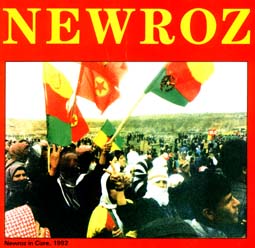
In Amed delegations from European countries such as Finland, Belgium,
Germany and Italy are expected to attend to the Newroz observations.
There are deputies and representatives of human rights and NGO's in
the delegations.
Newroz is observed continuously
On the other hand, Newroz observations which began ten days ago, are continuing. Groups of people in Amed lighted fires, as groups in Izmir observed Newroz with fires and halays.
Magnificent preparations for Newroz in Europe
Marches will take place on 20 March night all around Europe. Thousands of Kurdistanis are expected to attend to the demonstrations.
Confederation of Kurdish Associations KON-KURD made a statement on the Newroz program of its affiliated associations.
Kurds will continue their activities until end of March.
There will be meetings, feasts and observations as well as central marches.
![]()
3. - Ozgur Politika - "There could be a march
to Ankara like that of the Zapatistas":
PKK President Abdullah Ocalan, making reference to the "Peace
March" of the Zapatista guerrillas, which was greeted with great
enthusiasm by oppressed all across the world, and said that a similar
march could be held in Ankara. Ocalan called attention that constitutional
guarantee for this was essential.
PKK President Abdullah Ocalan said that a peace march similar to that of the Zapatista guerrillas could be arranged in Ankara if constitutional guarantees were secured for democratic and cultural rights.
Zapatur 2001 example 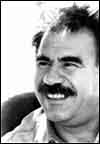
In a statement made through attorneys Dogan Erbas, Hatice Korkut,
and Irfan Dundar from the Century Law Firm, with whom he met on Wednesday,
Ocalan touched on the "Zapatur 2001" march in the capital
of Mexico led by Zapatista guerrilla leader Marcos from the Mexican
state of Chiapas and 23 guerrilla commanders for the granting of relative
autonomy to the local people. Ocalan said that a similar march could
be held in Ankara and that a call from the President could open the
path for this. Ocalan said that the primary condition for holding such
a march was for democratic and cultural rights to be constitutionally
guaranteed, and continued to say the following: "Just as in the
Mexican example, a call from the President in Turkey could open the
path for this. In such a situation, thousands of people could make a
"peace march" to Ankara similar to the Zapata march, including
dropping of weapons. Such a march could be started by constitutional
guarantee for democratic and cultural rights. This would be the most
correct response to overcoming the economic and political crisis being
experienced in Turkey."
Our contribution to democratization will be great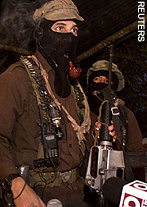
The PKK President said that there would be a democratic ascent in
Turkey and stressed that their contribution to this rise would be great.
"Turkey, Mesopotamia, and Anatolia will be reborn upon its great
cultures," Ocalan said, continuing, "This rebirth will be
a democratic ascent. Our contribution to the democratization of the
republic will be just as great as the contribution of the freedom fighters
to the establishment of the republic."
Positive thoughts will be presented
Ocalan noted that the difficult situation that had been
entered with the economic crisis being experienced could be overcome
in this fashion and said that they would avoid negativities that would
make things difficult for Turkey. Ocalan continued to say the following:
"We will be the defenders of the unity of a democratic and secular
Turkey. We will avoid negativities that will make things difficult for
Turkey in these trying days. We will present every type of positive
thoughts. We will do everything in our power for our peoples to present
a democratic unity and wholeness." ![]()
4. - BBC - "Turkey seals new IMF deal":
Dervis: I hope we will obtain adequate foreign aid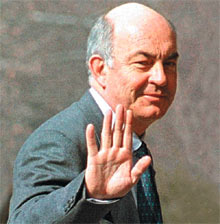
Turkey and the International Monetary Fund (IMF) have agreed a new
economic programme aimed at reviving foreign investors' confidence following
the financial crisis last month.
The deal was reached after two days of talks with the IMF official responsible
for Europe, and after a meeting with representatives of the G-7 countries.
The IMF has backed the programme and is looking at bringing forward
$6.25bn of scheduled loans to Turkey.
"We have reached an agreement on the financial and monetary policies
that will be implemented," Turkish Economy Minister Kemal Dervis
told a press conference.
Mr Dervis said that Turkey would outline the details
of the programme by the middle of April when it would submit a letter
of intent to the IMF.
At the press conference, Mr Dervis again stressed that he would push
on with economic restructuring including reforms to the banking sector
and faster privatisations.
"The positive outcome of these contacts depends on our resolve
in implementing the reforms... I hope we will obtain adequate foreign
aid with this programme, on which framework we agreed with the IMF,"
he said.
The program aims to bring annual inflation, which is at 30%, to below
20% by 2002 but Mr Dervis warned it would rise in the next few months.
He expressed hope that economy would recover later this year despite
an expected 2% fall in growth.
IMF given assurances
IMF European Department Director Michael Deppler said the Fund might
bring forward the release of some $6.25 billion in loans pending to
Turkey and allow more flexibility in their use.
"We are looking into questions of advancing the timing of the remaining
disbursement," Deppler told a news conference.
He did not say if the IMF would offer Turkey fresh loans.
Deppler blamed the failures of the last IMF programme "on problems
in the banking sector".
He said the IMF had been given specific guarantees that there would
be changes to create a "robust" banking system.
"There's no question that external assistance would help Turkey,
and the minister is seeking external support. But ultimately what is
going to matter is good policies to keep the thing going well,"
Deppler said.
The Turkish stock market rose 2.5% on the news but quickly lost the
gains.
No aid, no investment
Investors indicated last week that their confidence in Turkey would
only be restored once there was an offer of financial help from Western
sources.
The financial market's reaction to the package will be judged on Tuesday
when the Turkish Treasury will auction around $2.5-3.5bn worth of 3-month
debt.
The financial crisis last month resulted from Turkey's inability to
meet the demands of a three-year IMF deflation programme.
It was triggered when Prime Minister Bulent Ecevit and President Ahmet
Necdet Sezer clashed publicly over the pace of an anti-corruption drive.
The government was force to float the lira, which has fallen by about
30% against the US dollar, and inflation shot up again.
The failed IMF programme had cut inflation to 30% annually, compared
with triple digit levels of the 1990s.
Mr Dervis is expected to go the US in late March for talks with US and
IMF officials over aid.
Anti-IMF protests
Unions have threatened to oppose any programme that does not look after
workers needs and have called for mass demonstrations on April 14 to
protest against IMF-inspired policies.
Major workers' unions have united under an umbrella group named Labour
Platform to protest against the new economic programme.
The unions fiercely oppose any economic measures taken in cooperation
with the IMF, saying it would ignore the needs of people suffering from
the crisis.
EU reforms approved
Turkish Cabinet on Monday also approved the National Programme of political
and economic reforms to prepare the country for EU membership.
The program commits Turkey to political, economic and legal changes
aimed at eventually gaining membership in the European Union.
"We have taken the necessary measures to speed up the membership
process," Cabinet Minister Rustu Kazim Yucelen said.
Yucelen gave few details on the program, but the Hurriyet newspaper
reported the draft version did not cover contentious issues such as
granting cultural rights to Kurds, abolishing the death penalty and
curbing the military's influence in politics. ![]()
5. - Reuters - "New Turkish plan seeks 50% inflation":
ANKARA 
Turkey's new economic plan, designed to defuse crisis and restore foreign
confidence, may target annual inflation of 50 percent for 2001, well
above the 10 percent set by an IMF-backed program abandoned last month.
The new program took form in a series of meetings among Turkey's ruling
coalition leaders and economy bureaucrats on March 12.
A leading force in the talks was long-time World Banker Kemal Dervis,
summoned home from Washington last week with wide-ranging powers to
control the country's finances.
"The inflation target is expected to be set at around 50 percent
year-on-year in wholesale prices (WPI) and 45 percent in consumer prices
(CPI)," a source close to the government said.
Under an IMF-backed plan launched in January 2000, Turkey had lowered
inflation by around 30 percentage points to 32.7 percent in WPI and
39 percent CPI at end-2000. Inflation fell further this year to 26.5
percent and 33.4 percent in February.
But the February crisis, with stocks crashing and interest rates soaring,
forced Turkey to abandon controls on its lira currency that constituted
the bedrock of the plan. The lira was allowed to fall and currently
languishes almost a quarter below pre-crisis levels.
The sudden lira depreciation is expected to have substantial impact
on inflation, particularly in March and April. Banks which already saw
the 10 percent target as out of reach before the crisis will be forced
to revise forecasts.
"We are tentatively revising up our inflation forecasts. For 2001,
we now project year-end-inflation rates of 75.3 percent for CPI and
68.6 percent for WPI, up from previous estimates of 23 percent and 19
percent, respectively," Morgan Stanley Dean Witter said in a recent
note.
The source close to the government said the government was now expected
to revise down its gross national product (GNP) growth rate projection.
Turkey's original 2001 target set under the previous plan was 4.5 percent
after a high growth of around 6 percent in 2000. But high interest rates,
sharp lira depreciation and weaker domestic demand have made the target
unrealistic.
"The new target might be set around minus two percent. That means
Turkey will not grow this year but shrink," the source said.
The new program is likely to include radical measures to reform the
banking sector.
Any plan to reform the banking system is expected to include provisions
to retire the stock of duty losses. For this, Turkey would need billions
of dollars in additional loans from foreign agencies such as the World
Bank or the US Treasury.
IMF officials now in Ankara for talks on the new program will be looking
for a clear commitment from Turkish politicians.
They will need some assurance there will be no repetition of the public
row between Ecevit and the president that triggered a crisis still far
from being under control. ![]()
6. - Middle East Newsline - "Israel wants to complete water talks with Turkey":
JERUSALEM
Israel has decided to launch the last stage of negotiations
to purchase water from Turkey.
Israeli officials said the goal is to complete by the end of the year
an agreement with Turkey for the import of tens of millions of cubic
meters of war. They said the government has given the green light for
the resumption of talks after a delay of several months.
Finance Minister Avraham Shohat provided the final approval to the negotiations,
officials said. Shohat has set the parameters for the last phase of
the water talks.
Shohat decided that Israel is prepared to buy 25 million cubic meters
of water annually over the next five to 10 years. That amount could
be doubled over time.
The water from the Manavgat River would be transported by ships from
Turkey to the Israeli port of Ashdod. The key obstacle to an agreement
is price.
The finance minister was under pressure from both water experts and
the defense industries to complete a deal with Turkey. Water experts
warned that the coming winter would not ease the current water crisis
and defense executives said an agreement with Turkey was crucial to
win contracts for Ankara's military modernization program.
In Ankara, Turkish officials welcomed the Israeli move. They said Israel
has signalled that tension with Turkey concerning Ankara's support for
the Palestinians is over and that an Israeli water delegation will soon
arrive. ![]()
7. - Turkish Daily News - "Will the program usher
Turkey into new era?":
Turkey today announces its National Program to fulfill the Copenhagen
criteria after months of wrangling over its content. The National Program
by which it bounds itself to initiate a series of reforms is another
historic step in Turkish-EU relations
The National Program comes at a time when Turkey is passing through
one of its worst economic crisis in decades. Experts argue that in case
of strong support for the program, it can also give morale to economic
markets
While the National Program will tackle every single issue of reforms
to fulfill the Copenhagen criteria, the status of the National Program
and granting cultural rights to Kurds are expected to be sticky issues
of the program
ANKARA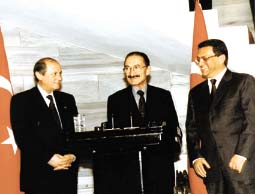
Turkey today announces its National Program by which it will detail
its plans to fulfill the Copenhagen criteria, a must for eventual European
Union membership in a bid to respond to EU conditions that were outlined
in the Accession Partnership Document endorsed by the EU last year.
The Prime Ministry declared yesterday that three coalition partners
have considered the National Program and have reached a full agreement
on the content of the document. While Deputy Prime Minister Mesut Yilmaz
responsible for Turkey-EU relations will have a press meeting today,
Foreign Minister Ismail Cem is expected to hold a meeting with EU member
countries' ambassadors in Ankara late in the day in a bid to discuss
with them the details of the program.
As it is announced that the government had finalized the last details
of a National Program of political and economic reforms to prepare the
country for EU membership, this week is expected to witness many debates
on the content of it. The EU laid out its own version of what Turkey
needs to do before membership talks can start late last year in the
Accession Partnership Document.
Since then Turkey's three coalition partners have been wrangling over
the details of its own National Program -- not to be confused with an
economic program currently being prepared after the financial crisis.
"The three leaders of the coalition parties have revised the EU
National Program of Turkey finally and reached a full compromise,"
the Prime Ministry said in a statement yesterday.
The announcement of the document comes at a time when Turkey is going
through one of its most serious economic crisis in decades. While opinion
polls consistently show that the vast majority of people want to be
in the EU, experts argue that the latest economic crisis has dramatically
increased the number of people who see a possible EU membership as a
recipe for Turkey's problems. Arguments are raised by different circles
stressing that had Turkey been a member in the EU, the recent economic
crisis which resulted in the devaluation of the Turkish lira some 25
percent against the U.S. dollar would never have happened. A strong
backing of the National Program by political parties may create a positive
ambiance for the faltering economy as well, experts argue.
Relations between Turkey and the EU have long been fraught, and many
Turks doubt whether the bloc will ever admit Muslim Turkey to what some
see as a "Christian club." The EU's accession document sparked
anger in some quarters in Turkey because of references to sensitive
issues such as Cyprus and cultural rights for Kurds -- an issue that
the army and some nationalists see as fuelling separatism.
The statement said the plan would be examined by the government on Monday.
"The National Program is a turning point in relations between Turkey
and the EU," it said. "The National Program that we will submit
to the evaluation of the government tomorrow [Monday] will be evidence
of the political determination, self-confidence and wide social consensus
of Turkey for full membership in the EU."
MGK and Kurdish issues will dominate discussions
The status of the National Security Council (MKG) and granting Kurds
their cultural rights will remain the basic topics of discussion in
the wake of the National Program announcement. The status of the MGK
and its influence in Turkish politics has long been debated both in
Turkey and in the EU. The EU has made it clear on many occasions that
the MGK should be redefined like its counterparts in EU-member countries.
The National Program is expected to cite the increasing number of civilian
members in the council as a step to reform it.
On the Kurdish issue, which has always been a central item of discussion
in Turkish-EU dialogue, the program is not expected to commit itself
to allow education in Kurdish. Instead an interim solution of granting
"social and cultural activities" to those people who speak
minority languages is expected to be announced. The very definition
of minorities is another complicated issue. While Turkey does not recognize
any of its Muslim population as "minority," the EU insists
that Kurds should be given "minority" status.
The National Program is a document of compromise as announced by the
Prime Ministry and expected to solve issues by time rather than producing
prompt recipes. ![]()
8. - Turkish Daily News - "Carnations and complaints:
Women's committee visits Diyarbakir":
This is the first time a group of well-known women intellectuals
including journalists and writers had come to Diyarbakir or for that
matter to Southeastern Anatolia
The most important note struck by the visiting committee of women was
that the women of Diyarbakir were not alone; the most important problem
was that of language -- Kurdish women don't know Turkish due to circumstances
beyond their control
DIYARBAKIR
Carnations and complaints were the order of the day when a group of
24 women from Ankara and Istanbul arrived in Diyarbakir on Saturday
morning. This was the first time a committee of well-known women intellectuals,
including journalists and writers, had come to Diyarbakir or for that
matter to Southeastern Anatolia. The trip was organized together with
the Diyarbakir Women's Platform.
The women of Diyarbakir along with young girls in traditional costume
met the group with carnations as well as complaints within the framework
of "Women's Support for Peace." Actress Turkan Soray was supposed
to attend but at the last minute she was taken ill. Those who attended
were Duygu Asena, Perihan Magden, Zeynep Oral, Nilgun Cerrahoglu, Sukran
Soner, Vicdan Baykara, Guler Kazmaci, Zeynep Atikkan, Pinar Selek, Julide
Kural, Ayse Duzkan, Pelin Erda, Sema Pekdas, Zubeyde Atay, Nemika Tugcu,
Gulsen Alpay, Semra Somersan, Zeynep Avci, Halime Guner, Yasan Seyman,
Fusun Sayek, Saynur Varisli and Elif Ergun.
The two-day program started with a meeting with Kurdish women from the
region in the Diyarbakir Metropolitan Municipal Meeting Salon. A large
group of women had gathered outside and were dispersed on the orders
of the new Diyarbakir police chief. But before they were dispersed,
committee members went out on the balcony of the municipal building
to wave to the assembled women.
The names of the women who had come were also read out and for example
feminist writer Duygu Asena had an opportunity to say how the women
of Diyarbakir were not alone. Where peace, democracy, freedom of thought
and human rights didn't exist, women were enslaved; women in Diyarbakir
and elsewhere in Turkey were equally enslaved. Asena's words were supported
by those of sociologist Pinar Selek who spoke about how all of them
felt the same things.
Even though the members of the committee lived fairly close to Diyarbakir
-- it took them approximately an hour and a half to reach the city by
air -- the differences in their ways of life were very striking. She
suggested that the one way to bridge these differences was by bringing
the women together. Afterwards, during the meeting inside the group
listened to the problems faced by Kurdish women and debated ways in
which these might be solved.
A major problem was identified as the fact that Kurdish women do not
know Turkish and in fact what was said at the meeting had to be translated
into Kurdish and vice versa. One reason for their lack of understanding
was attributed to the 15 years of clashes in the East and Southeast
between members of the outlawed Kurdistan Workers' Party (PKK) and the
Turkish military. One proposal to solve some of the problems was more
publicity provided by the women journalists and writers among the group.
The program on the second and last day took the women's group for breakfast
to Carikli, a tent village and the poorest area of Diyarbakir. Carikli
consists of some 5-6,000 people who had to leave their own villages
and migrate to Diyarbakir because of the clashes with the PKK.
The Piro Tuturmaz family was the host although the food offered was
undoubtedly collected from everywhere in the tent village. In the afternoon
the participants went to Kayapinar to plant trees as part of the conservation
efforts in Diyarbakir before departing to Ankara and Istanbul. ![]()